White Invincibility Is Not Radical
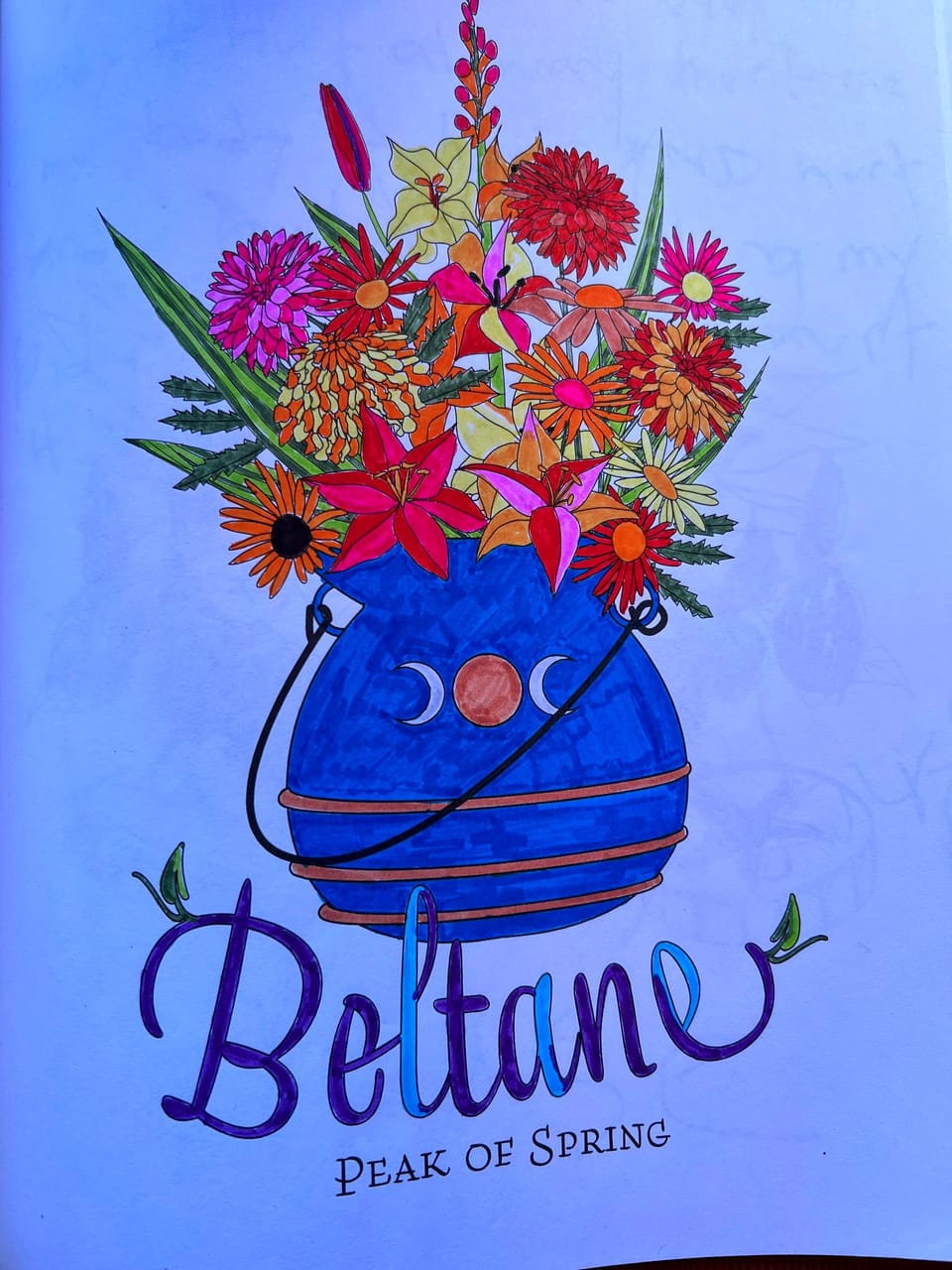
“NICE BUTT,” HE said when I said goodnight and started to leave, jumping out of his chair to press his whole body against the front of mine. He reached around fast for my ass, which he grabbed with both hands. Immediately, I started pushing him away with my left hand and leaning my body back, trying to pull us apart as I said, “We ask for permission for that sort of thing,” but he pushed further into me, his mouth against my neck once, twice, after murmuring, in a low, sexy tone: “Mm, thank you for reminding me.”

We’d been introduced just moments before, on a queer sanctuary in Tennessee widely considered the oldest commune of the Radical Faeries, a supposedly countercultural movement started by cis gay white men forty-plus years ago—though the Faeries are just one subculture active on the land now. In the bathhouse on the property, there’s a reminder: CONSENT IS MANDATORY. As a new attendee to this annual gathering, which hosted some 600 people, I got a link with info that included how to define consent: not an absence of a “No” but an active “Yes.”
Last year, I went to two gatherings on the West Coast, one of them explicitly thrown by and for Radical Faeries, the other heavily attended by them. I was assaulted at both, twice at one. Let’s just use the correct word here. If any of the three cis white gays who smack-grabbed my ass last year, one of them sliding his hand under my dress first, another reaching out to grab and lengthily rub my butt, keeping a firm hold and following me even as I tried to get away—if any of those people had done that at work or on the street or even at a frat house, that’s what we’d call it. And since it wouldn’t have been coming from my own theoretically safer, woker, more loving community, I’d have recovered more easily. Even the US Department of Defense considers “sexual contact…when the victim does not or cannot consent” sexual assault.
This time, 25 days ago, I walked away quickly after the perpetrator—he appeared to be white as well—let go. As soon as I was out of eyesight, I burst into tears. I stood there in the dark, on a path winding through the woods, dense with the tents of fellow camping queers, alone. People had hung a mishmash of stringed lights among the trees; I could hear music from a tent not far away.
I walked back toward my own tent, hyperventilating, trying to regulate my breath, trying to figure out what to do, who to find. A patch of tents right next to mine, I remembered, was full of people who were socialized female. I didn’t know them, but I knew they would get it.
They weren’t home. They were out dancing, or praying, or fucking or talking or showering or making music or having snacks, or any of the other things happening among the people who’d shown up to this Beltane celebration, which has been happening every spring for more than forty years. A friend I’d made at Beltane in California last year had been trying to convince me to go to this one ever since. It was different here, he said, than at the places I’d been so far: more inclusive. Less gropey.
And indeed, where I’d been one of two trans people at the Beltane I went to in California and one of just a few at the hundreds-strong summer gathering in Southern Oregon last year—I went to a smaller “gatherette” hosted by longtime Faeries on private land as well, where I was the only, though the trans-filled Bay Area was a short drive away—the sanctuary in Tennessee was filled with hundreds of magnificent trans bodies of every conceivable configuration. Where the Oregon gathering had had one Black person and the gatherette none, in Tennessee people of color erected dozens of tents in a dedicated safe camping zone, along with an uncountable number throughout the rest of the property. Women were not just allowed but welcome. Cis white males felt outnumbered to me; many of the rest of us wandered nude and, I felt anyway, unjudged.
And unmolested.
Until the moment I wasn’t.
The AFAB-inhabited tents near mine were all dark and quiet. But across the narrow path was a pop-up beauty salon, a high canopy over tables and shelves stocked with makeup, nail polish, and glitter, with rows of mirrors topped with vanity lights. Three people were standing in front of them getting ready, but I walked to my own tent just a few feet away and sat down. I asked myself what to do. My experience at gatherings so far was that when I told people who were socialized male, which it was my impression these three strangers had been, that I’d been slapped or grabbed or groped, the response often lacked the appropriate outrage.
Regardless, the worst thing I could do, I decided, was isolate myself and use the billion tools I’ve had to develop to deal with sexual trauma alone, like I always do. I decided to try to ask for help.
“I don’t know you but I just got groped,” I said, walking up to them, softening the language—I would have felt empowered to say “assault” to strangers born with vulvas—“and I need to tell somebody.” They turned, attending to and surrounding me immediately. They held out hands, and offered to listen or just be there; they offered commiseration and apologies that it had happened and supportive touch if I wanted it. One eventually commented that there were a lot of subcultures coming together in this space, which was true—there were cis queer men and cis gay men and trans queer men and trans gay men, multiple generations of each. There were cis lesbians and trans lesbians and Two Spirit and genderfluid and pangender and nonbinary and agender people, and trans people who used to identify as lesbians and trans people who used to identify as gay men. There were people who are Black and people who are white, and Latine and Portuguese and French people. Bisexuals. Asexuals. Lots of pansexuals. People with no fucking money and people with trust funds. There were straight people, for god’s sake. But when this stranger kindly holding my hand, who presented as a gay white man, said, “There’s a lot of subcultures coming together here, and sometimes they clash in really gross ways,” what I bet they meant mostly if not entirely was: Cis gay male culture has a molestation problem. And we all know it.
The older generation often gets blamed, and indeed my newest perpetrator was decades older than me. But I was barely a few months into being recognized as male by strangers before a cis white gay who was definitely younger than me took the liberty to suddenly stroke my chest and hips while asking me what I jerk off to. We were not at a sex club in Florida in the middle of the night—where people still need to ask permission. We were in San Francisco. At noon. At an academic conference.
“If you’re having a hard time later tonight,” one of the people sweetly supporting me at the beauty salon in the woods reminded me, there was a group of people on the land available to help people going through something. They reminded me where I could find them. This suggestion was thoughtful. But it also boiled down to me doing work to get another person to do work helping me do The Work, while the perpetrator went about his night and life doing—and changing—nothing.
Hurt people hurt people, people are constantly saying. I would love to retire this phrase from the lexicon.
“DO YOU WANT to eat a mushroom?” a new pal asked me last July at Wolf Creek Radical Faerie Sanctuary, in Wolf Creek, Oregon, and I did, so I did—half of the single cap and stem he broke with his fingers and handed to me. We set intentions (in my case, joy!) and chewed them up and turned on a hose lying nearby in the grass, bending our mouths to the water in the dark. (For the record: No illegal substances were allowed.)
A couple hundred yards away, a large crowd of men danced around a fire to techno that carried as far as we stood. Many of them were naked. Almost all of them were cis, and nearly every one was white. I had said aloud to someone earlier that I probably wouldn’t do any mushrooms because I didn’t feel safe enough in this place where 200 Faeries were camping and communing; I’d already had the thorough ass-groping by the stranger who tried to keep his hands on me as I backed up (at eight o’clock in the fucking morning, on the way to breakfast one day), and it’d been only hours since the man who reached up under my dress had put his hand on my bare butt. Plus, in more than a week at this “Radical” Faerie “Sanctuary,” I’d never heard so much live hate speech in my life.
And I was a human-rights reporter for a decade.
Last year was my first season of trying to participate in functions thrown or attended by Radical Faeries at all. Among many trans people and people of color, the Faeries—however wonderful some of the individual members of this wildly decentralized identification—are famous for a culture of exclusion. For decades, many gatherers actively fought to keep trans people out of Radical Faerie spaces. My introduction to them as a fag early in my transition was through a close cis friend involved in Portland RadFae who sent me a call to one of their gatherings, which even in 2019 did not include any language welcoming or including trans people. (A very small number of trans people in Oregon have long been showing up anyway.) The next year, the same friend told me that if I—transsexual—came to his Faerie-filled birthday party, it would be stressful for him.
Still, I found it shocking when one night at last summer’s Spiritual Gathering of Radical Faeries at Wolf Creek, a cis white guy in the main eating area started yelling about “These TRANS people,” venom on the emphasized word and emphasis his. It felt like a knife to my sternum before I even realized what was happening. I stopped being able to hear the person talking to me and zeroed in on where the guy sat, a table away, an involuntary hypervigilance in response to brewing hate crimes. His rant continued to encompass some individual “TRANS person, who is SO fucked up,” in the earshot of dozens of Faeries. The guy he was talking to nodded sympathetically. I looked around, waiting for someone to object. No one did.
Another day, at a large meeting, someone (hi boo if you’re reading this!) stated that people could share their pronouns along with their names during introductions if they wanted—to which one Faerie did object, yelling to forget about pronouns. Nobody objected, in turn, to him except the original suggester. I looked at the other trans male in the space, who’d just arrived on the land; he was looking at the scene with alarm. Everyone else calmly proceeded with the agenda. Later, at the pinnacle event of the 10-day gathering, the emcee told a transphobic joke into the microphone. The audience erupted in raucous laughter.
“Nobody went up to them,” a friend of mine asked when I got home and told him about so much loud—literally amplified—transphobia, “and said, ‘Hey, that’s not cool’?” I adored the earnest simplicity with which he shook his head and said: “I don’t understand that.” But nobody said anything, either, as far as I know, to the older men who I was later told had a history of preying on or taking advantage of younger men when a sweet, college-age boy showed up at the gathering with doe-eyed virgin vibes, though some of the Faeries my age were actively concerned about him.
“Someday the older guys will all be dead,” so many—too many—middle-age Radical Faeries have said to me about doing nothing.
It’s hard to speak up. Sometimes it’s impossible—when the emcee delivered his transphobic punchline, I froze for a second, slapped-feeling, before saying out loud, “That’s transphobic,” looking around to see if anyone else noticed or cared. But when no one did, I felt too defeated by that crowd to yell it. As I processed the gathering after leaving, my most compassionate parts broke through my anger, and I could see how speaking up is a skill, is a muscle, that doesn’t work if it doesn’t get any exercise, and if you’re not exercising it, it’s as sad for you as for anyone you could be speaking up for. I could see how the fact that queer and trans people are victims of violent crimes at four times the rate of non-queer and non-trans people feeds into a culture of not speaking up, and how speaking up that someone isn’t being treated okay also requires acknowledging that you’ve been treated in ways that weren’t okay. I understand, as well as anyone on this earth, not being ready to acknowledge that.
But then, these things are all true—are statistically only more true—for trans women of color, for example, plenty of whom have long been speaking up for all of us. One of my friends who’s trans and Black pointed out a different perspective. “You don’t call out power if you have power,” they said. That thread, it unravels too easily in your direction once you start to pull it. “These cis white gays,” they said, “benefit from power structures.”
As does anyone else who finds themselves in power or its proximity. As I write this, the caretaker who has been serving Wolf Creek for a year, the self-same Black trans person, who for a year has been cooking and cleaning for mostly white visitors as well as participating in endless meetings and activities that keep the land running, honoring queer ancestors resting there with dialogue and offerings, and continuously educating people patiently about Black and trans issues—all in exchange for a modest food stipend and very basic lodging—is being ousted from the property. The mixed-race Guiding Circle that decides who can be at Wolf Creek “Radical” Faerie “Sanctuary” said that the caretaker position, though in the past it’s been held for years at a time, has a limit of one year and so informed the Black trans person who’s been doing unpaid labor for whites there—who they knew for a fact was homeless and had no other place to go—that he had to leave.
At the “gatherette” I went to last year, one night, I watched a young cis white gay come out for dinner wearing a several-foot-high Afro. It had a ridiculously tiny cowboy hat perched on top. He strutted proudly in his boots, smiling, and while my eyes went wide with disbelief, 50 of his fellow cis white men erupted into uproarious laughter.
“You should have seen your face,” one of the only people of color present at this invitation-only event said to me at the end of the night. My jaw, they said, dropped to the table at which I was sitting. Here’s what had happened for me in that moment: I saw someone doing the wig version of blackface—“funny not for the right reasons,” as a friend put it later—and simultaneously heard a huge crowd of California-liberal gays, in the year of our lord 2023, respond not only like nothing was wrong but like everything was excellent. So then, socialized as I was to accept cis white male reality as the only reality, and raised as I was by an abuser/father whose life depended on convincing me that my reality was never reality, I started to wonder what was wrong with me. If I was seeing what was happening so differently than everyone else, I thought, then I must be seeing it incorrectly.
I tried, frantically, to think of ways I could be misreading the situation. At the same time, I looked around the faces of the crowded tables, all still laughing and now getting up to congratulate the Afro-wearer on his amazing outfit (earlier, he had told me that before he learned I was trans, he thought I was an actual man), searching for any sign that I was not insane. There were no Black people in attendance. When my eyes met the aforementioned person of color, they were making the opposite face of everyone else.
That should have been enough. Still, I had to ask them.
“Am I insane?” I called over in their direction.
“No,” they said.
So I got up. Was I mad that none of the cis whites in that crowd were doing what I was about to do, were leaving this white-on-white education to the singular trans person at the whole event? When I was already being regularly glared at by some of the older cis men, who, I was later lectured, did not think I was acting as graciously as I should have for being invited at all? Yes. I was. But this was exactly the kind of devastation I was experiencing when no cis person did shit about transphobic shit, and I wasn’t going to be another white person doing nothing about this.
“So the joke here,” I said, approaching the wig-wearer with a soft, quiet tone to my voice as he was posing for pictures, because I’ve learned to treat cis white men as soft as little tiny babies no matter what they are doing (see Maïa Nelles-Sager’s spectacular A List of Things I’ve Said to Men This Week Instead of “You’re Wrong” or “No” to Spare Their Feelings, Even Though They Were Wrong and I Knew the Right Answer), “is that you’re a white person wearing Black hair?”
“I don’t mean it to be appropriative,” he said, and the conversation went on longer than it should have needed to after that, but after I repeated several times that it was not landing well, he said, looking pissed, “I’ll go take it off.”
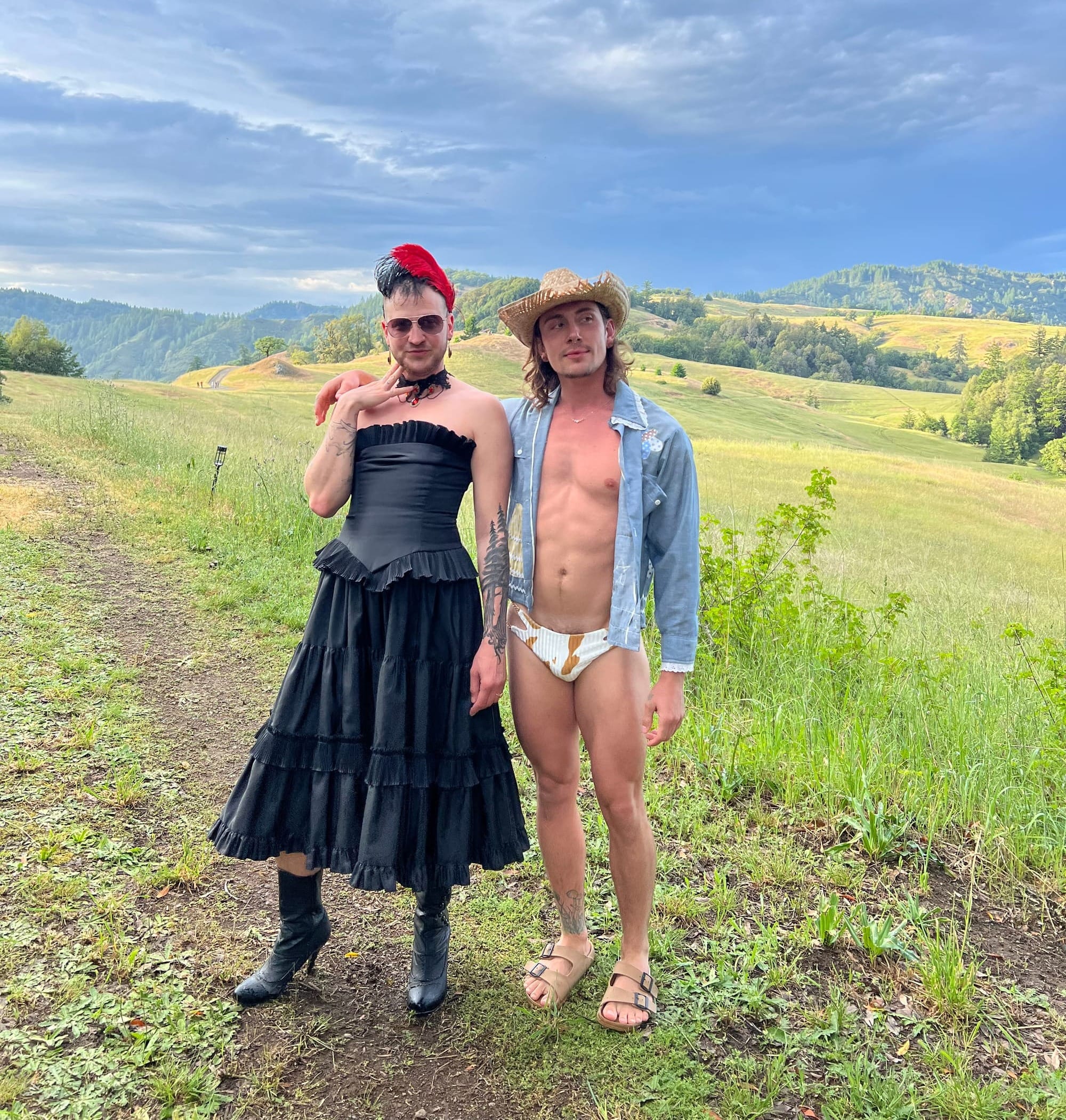
Assume best intentions!, we the woke always say. Maybe he didn’t know. “I didn’t take it that way at all,” one of the other whites standing near us said when he heard what I was saying. But my same Black trans friend again had a different perspective when I recounted the story: “You see how fast he went to ‘appropriation’? He’d thought about that shit beforehand.”
There’s lots of things we all don’t know. I am regularly informed by my younger friends that something I’ve said because I think it’s the cutting edge of inclusivity—“latinx,” for example—is now outmoded, and so it will be until my death. I know that, like me, none of the gays who’ve assaulted me spent their childhoods being read amazing consent books like the ones they have these days. But in the first instance at Wolf Creek, I told someone running things what happened, and later that day, they announced to the whole group as we circled for dinner that we don’t touch people’s asses without asking. Some people responded with assenting noises, but I heard others mock consent in smaller conversations. At other moments, I saw cis white males put their dicks or whole naked bodies on people who didn’t want that, and saw the unwelcomeness in those people’s cringing response. I was told about a penetrative rape that had happened years earlier on the land, and about a non-penetrative (but still terrible) assault the very day it happened on the land, and it’s not like I was going around asking as a reporter or some kind of Gay UN Observer—although the gathering needed one.
Why, I’m imagining a cis Faerie maybe asking, does this random trans person know about all these incidents? Why didn’t we hear about them?, to which I’ll remind anyone curious that people track—people are always unconsciously tracking—other sympathetic people who might hold or help with emotional labor, and minorities, including this particular trans person, are often easily identifiable as one.
Consent is fucking required, it says in large letters on a door at Wolf Creek. There are also signs in the toilet saying transphobic language will not be tolerated. After nothing meaningful happened when I told someone about the first assault there, I didn’t bother telling anyone with power about the second. The day before, another person in attendance walked up to me and told me plainly he’d just been grabbed and forcibly kissed. He’d managed to extract himself, but was clearly shaken. I asked if he needed anything or wanted to tell anyone, but he said he knew nothing would happen if he did, which he felt was worse than not telling anyone at all.
Here are some reasons, according to cis gay men I did not ask for reasons but who gave them to me defensively anyway, for assault and discrimination among cis gay men and Radical Faeries: Old people exist. The AIDS pandemic was unfathomably traumatizing. Cis gay men have suffered discrimination. Cis gay men have historically been forced into discreet sex.
Hurt people hurt people, everyone is constantly saying. I would love to retire this phrase from the lexicon, or at the very least edit it: People hurt people. All people have been hurt, and as a person who is also well versed in unfathomable trauma, I am not interested in lumping together or excusing the traumatized or using trauma as an explanation for why theoretically unacceptable behavior must be tolerated.
Because trans people are also hurt people, also by virtue of their very existence. As are people of color. As are trans people of color, who are also disproportionately affected by AIDS, in a compounded daily-dehumanization-by-all-systems way that I can barely conceive, though I can conceive a lot of dehumanizing pain. Lots of hurt people don’t hurt people, and the fact is of course that whatever kind of person you are, you can decide either to do or not do anything in response to acts of unwanted sexual aggression at your own party.
So I knew what kind of place Wolf Creek “Radical” Faerie “Sanctuary” was by the time I decided to take one-half of one mushroom during the final big dance party around the fire last July. I knew the feel of the crowd and of many people present. When the medicine came on, I danced purposely at a distance from the nude cis men close to the flames touching each other, purposely near people I knew were allies. Still, when, after hours of swirling in a long, voluminous white skirt reflecting the sheen of full moonlight, I sat down in the grass to take a rest and close my eyes, I opened them to find one of said allies crouching over my head, his bare genitals nearly touching my face.
Everybody knows this about cis gay male culture: It tends to grope first and ask questions later, if at all.
“YOU’RE GOING TO another one?” a trans friend of mine had asked, surprised, when I’d told him I was going to Wolf Creek last summer, shortly after my first gathering and the gatherette—after the minstrel show and hostility at the latter, and after some older dude had grabbed my ass at the former, his hand warm and meaty through the thin fabric of my skirt. I was so caught off guard, a false sense of ass-amnesty having developed after a couple of days without it happening, that when that was suddenly shattered I started shaking immediately.
Before I’d arrived, I’d paused many times to practice what I was going to say to stop incoming nonconsensual touch, because I know this, everybody knows this, about cis gay male culture: that there’s a tendency to touch or hug or kiss—or grope—first and ask questions later, if at all. It was default hugging that I was most concerned with, total strangers moving in to press their whole bodies against me—total strangers who were often partially or fully naked—and that I indeed spent most of my energy declining, though there were also hands on my thighs, on my arms, on my shoulders, which all got exhausting enough that I often just let it happen. (Pro tip: Extremely simple questions to ask humans you are about to press yourself upon include “Are you a hugger?” and “Do you want to be touched?”) More invasive iterations can happen more often to smaller or perceived-femmier members of the community, though of course they can—and they do—happen to anyone. Talking about my experiences last year to a taller, broader gatherer, he said he took on less of it than I did—“Because I’m bigger than them.”
But, yes. Last year, after two not-great-for-me functions populated by Faeries, I was going to another one. Because my spirit guides and ancestors were strongly encouraging me to, and I see why: They take place on beautiful, soul-nourishing pieces of land (see photo above) filled with strong queer ancestry and literally lifesaving community. Before I went to the first one last year, I had not just thoughts about but an actual plan for ending my life. But then when I got there, I met Ryan, a dear, sweet friend who showed me the possibility of possibly having the kind of love I need to survive.
And then at the second one I met Alex, a burst of cell-charging light.
And then at Wolf Creek, I met West.
At the very moment the hand of the man at Wolf Creek who’d reached under my dress made contact with my ass, though, as I was sitting down to dinner next to him one night, my internal wisdom chimed in calmly but firmly: I won’t do this again. I knew I wouldn’t return to a no-women-and-nearly-no-minorities Radical Faerie gathering. If that meant I was going to die from the crippling ache of never meeting adequate amounts of queer family, so be it. I owed it to myself to protect myself from assault, to keep my body out of places where men would not just possibly but probably violate my sovereignty—and where no meaningful action will be taken in response.
And then just a few hours later at the same “sanctuary,” while I was sitting on the ground taking a break from dancing: A dick in my face.
He didn’t end up dick-slapping me, this face-croucher. He was dancing, too, wildly, primally, and had brought his dance into a straddle over my body. I froze, stunned—who has imagined or anticipated and planned for this scenario?—equal parts terrified and trusting as the mushroom in my system helped me chant through my alarm. He’s not going to hurt you, I told myself. He’s not going to hurt you. He’s not going to hurt you.
He’s not going to hurt you.
He swung his genitals directly at my face, nearly missing it, several times over, then backed up, dipped low, and sat down on my dick. The thin gauze of my dress was the only thing separating us. He’s not going to hurt you. He’s not going to hurt you. I had actually spoken before with this guy, one of the few men of color there, at some length, about movies and friendships and international politics and civil rights. He looked me in the eyes as he rubbed and swirled and danced his genitals on top of mine.
He’s not going to hurt you.
When I went to bed that night, I’d been dancing and resting and dancing and hydrating for hours. The one-half of one mushroom should have been well worked out of my system. I took a shower at the outdoor showers in the dark, the music done, the people all wandered off into their tents, and walked back to where my RV was parked. When I lay down, though, I was kept up by the medicine for several more hours. Shapes with sinister sexual energy unfolded when I closed my eyes, demons inside men, men consumed with plunder. I writhed around in bed, sick with it, sick with the culture of cis supremacy and invincible whiteness that had enveloped the entire event, until I lurched up and vomited into my sink.
The next day, I saw the guy who’d straddled my lap and face. He approached me somewhat sheepishly and asked: “Was that okay?”
Mainstream straight society is doing better on consent and inclusivity than cis gay males.
THE NIGHT I was assaulted in Tennessee, I considered killing myself.
It was far from my first time, as I’ve already acknowledged—either being assaulted or considering suicide. Those things aren’t unrelated. According to prevailing estimates, thirty percent of rape survivors attempt suicide. And half of transmasculine people do, so it’s altogether pretty unbelievable that just thinking about it is as far as I’ve ever gone.
After I walked away from the three kind strangers at the beauty salon, I got in my tent. Soon after, the friend I’d arrived with—dear sweet Ryan, whom I’d met at last year’s Beltane—came back to his tent next door, and I told him what happened. “What’s the process?” I asked him. He’d been going there for decades, but didn’t know of one. When I went to bed, he walked to the assistance table at the front of the property, but it was unstaffed at that hour.
I lay down and tried to soothe myself, breathing deep, telling myself it wasn’t my fault. It wasn’t because I was trans. It wasn’t because I’d been walking around in my underwear. It wasn’t because I hadn’t worked hard enough on myself to get the whiff of abuse-survivor and prey off of me. I prayed to my ancestors and transcestors to help me move past it, and for the first time that I ever asked them for anything, they said:
No.
No. I didn’t need to just get over it. What happened was a big deal and needed to be treated as such. Feeling unsafe, feeling violated, feeling like a piece of garbage, which is how being manhandled like an object always makes me feel, I lay in my tent stressed and spiraling. I could leave. I would leave, if that’s what my most wounded parts needed me to do to feel taken care of. We were in the middle of no place, but I knew of someone who’d Ubered there, which meant if I hiked to cell service I could probably get picked up; I could get a new plane ticket home, or spend a couple of days in an airport hotel. Either way, I was looking at probably $500 of expenses—$500 I don’t have. I felt trapped, which deepened both my spiral and my desperation. By the middle of the night, I arrived at the somewhat inevitable destination.
These gatherings, they had saved my life by bringing me in contact with community I severely needed. And this one, with its parade of never-ending trans magnificence so seamlessly integrated among other types of people, it made me feel, down to my bones in a way I’ve never experienced, like I had a place in this world.
So if I couldn’t walk unassaulted here, the only place my presence was consistently greeted with appreciation instead of looks of concern or surprise or worse, and I couldn’t walk in the rest of the world—where I was generally unmolested—without being looked at like I didn’t belong, then why the fuck would I continue subjecting myself to this planet?
The next morning, I woke up, to the extent that I’d slept, weeping and raw. I told Ryan I might be leaving. I made an agreement with myself that I would go to the morning heart circle, a communal sharing meeting, where I said that I was angry and tired and crushed, that I was over being told that I have to accept assault as part of gay male culture—to extremely vigorous and too-understanding nods from the group. Afterward, one of the elders present, who was long active on the land, approached me to say thank you and sorry, and I asked them: What is the process here for this?
They said: There isn’t one.
There needs to be one. In this case, we devised an ad hoc action. Someone would go talk to the perpetrator and tell him he could not behave like that. I thought about asking them to tell him he should leave. I couldn’t bring myself to ask them if they would tell him he should leave.
I spent the afternoon wrestling with myself about staying. About how I needed to stay, and how I needed, too, to protect myself. I talked with Ryan about the logistics of going. I wandered alone to some maple trees, who’ve steered me in the right direction before, and leaned against one, talking, listening, working to integrate it into my body when it reminded me how powerful I was, who I was, until the sun started to dip in the sky, surrounding us in golden light.
When I left the isolated patch of forest I was in, I ran into the elder. The conversation with the perpetrator had gone well, they said, if I wanted to know what happened, and I did: He’d apologized. Profusely. He was so sorry, and would tell me how sorry he was to my face if I was open to talking.
I wasn’t.
I continued to see my attacker for a couple more days. But he put distance between us in a way that felt genuinely apologetic, not resentful or pissy, so I felt safe enough to stay as I’d planned to.
Or at least, that’s what I told myself.
When I got home, I found myself clenching my shoulders, bracing myself, as I went outside for errands. Soon my back seized and locked up, laying me out in agonizing pain, barely able to move for days. I stopped eating, then could only manage to eat takeout I can’t afford. I couldn’t work. I reached out to another trans person for therapy, who squeezed me in (probably to the detriment of his eating lunch, if I know him), helping me move through some of the disgust (GET OFF OF ME) and fear (it’s just gonna keep happening) and utter dismay (This is why I should have killed myself already, so this couldn’t keep happening) lodged in my muscles. We’ve had a whopping seven sessions in three weeks, all for free because I’m broke—more oppressed people doing more work on behalf of people who won’t.
It sounds like the community stepped up, said a facilitator at a general accountability meeting toward the end of the gathering. I had already gone home, but a friend I’d made brought up what had happened to me, and male-socialized participants sounded pretty satisfied with how things had resolved. But how they’d resolved was that the elder, a person with—surprise!—XX chromosomes, had approached me after I spoke up at heart circle, after my long, dark night, and we’d improvised an action to address an issue that is as old as fucking time, that definitely happened to others during that gathering and has absolutely happened a countless number of times in the four-plus decades Faeries have been gathering. At Wolf Creek last year, it was a nonbinary person who, after I told them about my first ass-grabbing on that land, made the consent announcement before dinner. It was an Indigenous Two Spirit person there who, after myself and the Black trans caretaker advocated that the gathering needed a pronoun talk after the “forget pronouns!” outburst, made sure one happened. The result was that at the dinner circle that night, many people said not just their names but their pronouns, which several fags who’ve long been visiting Wolf Creek told me they’d never seen at the annual big gathering before.
“You guys made history,” one elder, a self-described “dinosaur,” said.
“I fucking hope that’s not true,” I replied. That that was the bleeding edge of progress at that “Radical” Faerie “Sanctuary” in 2023: inviting pronouns.
It’s not enough. It is all not enough. It is not even remotely, even in the ballpark, not even on the same continent as Doing Enough. But our community is hurt, people say. Our community needs compassion because it is hurting. But that’s exactly why we need to do more, not less, than mainstream straight society, which is doing better on consent and inclusivity than cis gay male culture. Trans people (along with allies) have been fighting for a place on that Tennessee commune for decades, and they’ve palpably won it. And part of the healing magic of existing there as a trans person is that it is with other types of people—that it involves loving coexistence. More than half of all trans people are survivors of sexual violence, and all trans people have suffered forced secrecy at some point or place in their lives. I’m an incest survivor who didn’t feel safe enough to transition until 2017 and after the gathering spent ten minutes standing outside the Men and Women rooms at the Nashville airport having to pee and wearing a dress, trying to decide which one I’d be less likely to get hate-crimed in. More marginalized members of the queer community cannot afford more attacks from our own. We do not get the luxury of blaming bad behavior on our oppressions. And neither should anybody else.
Right now, my friend who brought up my assault at the meeting after I left—an Indigenous Two Spirit person—is creating a proposal for better Access at the Tennessee sanctuary. In my opinion, aggressors of violence, including racist, transphobic, and sexually nonconsensual behavior, should be asked to leave for the duration of that gathering, unless the subject of the aggression wishes otherwise, and required to complete an accountability or education process before returning.
“There’s no such thing as a safe space,” I overheard someone say at this Beltane, not in relation to my situation. (Guess their race and chromosomes.) And that’s probably true. But that doesn’t mean we shouldn’t try. That doesn’t mean we all let it slide when men who have access to TV and radio and newspapers and the internet and have definitely heard years’ worth of stories about consent and trans rights just decide none of it applies to them—I don’t care what year they were born. I shouldn’t expect a lower standard of accountability at gatherings on queer sanctuaries than I do in my local Walmart, where if some random shopper grabbed my ass, he’d be shown the fucking door.
The morning I was getting ready to leave the Tennessee sanctuary, the partner of the man who assaulted me asked if we could talk. He was so sorry about what had happened to me, he said, crying. He said he was sorry I had to take the steps, but so glad I had taken the steps, because: This has been a problem of his partner’s for years. For years, he said, he’d talked to him about it, but nobody else ever did, and so it continued until the night he was wrapping his arms around my extremely unwilling body to grab hold of my very sacred ass, where I’ve been desecrated so many—far too many—times before. Where my own father raped me when I was four years old, just seconds after I told him I was a boy, telling me as he pressed me facedown into a rust-colored suede couch, “This is what happens to little boys.”
It doesn’t have to. This is one of the many gifts that trans people and people of color and female and other non-invincible queers bring mainstream cis fag culture as it perpetrates cycles of assault on other men: The information that it doesn’t keep having to.
“TAKE MUSHROOM MEDICINE,” the seven conjoined cedars told me last week, when I climbed into a hollow made by their trunks and cried. They told me to ask for strength, and so when I drank the medicine tea I made the next day, I did.
Sooooo strong, I could feel from all the way down inside me. I am so strong. I breathed it in, over and over. Fourteen years ago, I went on a reporting trip where I’d been held briefly against my will and closed in a room where I was sexually threatened, and when I returned I asked my then-boyfriend to hold me down and fuck me. You are so strong, he said after. You are so strong, you are so strong, as I cried and fell apart on a serial abuser who at that time passed for safety. Who, at that time, felt like as safe as I’d ever get.
“We ask permission,” I said to the man who abused me three weeks ago. It cannot be overstated how difficult it is for a person with longterm developmental Stockholm syndrome and chronic complex PTSD to speak up in the moment—how much work it took me to be able to speak up in a moment.
Two days after I made mushroom tea, I woke up and took out a coloring book and markers, starting my morning by filling in some fiddly little lines. I noticed that I always did the edges of the open spaces first, carefully giving them a thick inside outline so I could then color freely, easily, with abandon within the frame I’d set. Hard part first, I thought. I always do the hard part first. I have been doing—I’m finishing doing—the hardest part first.

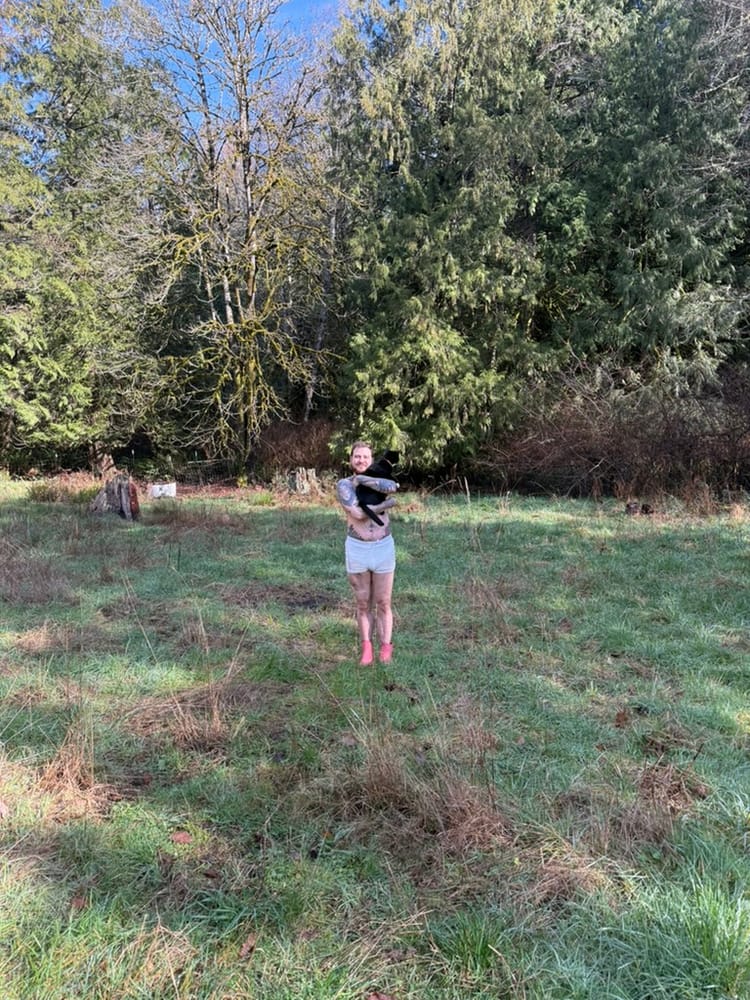
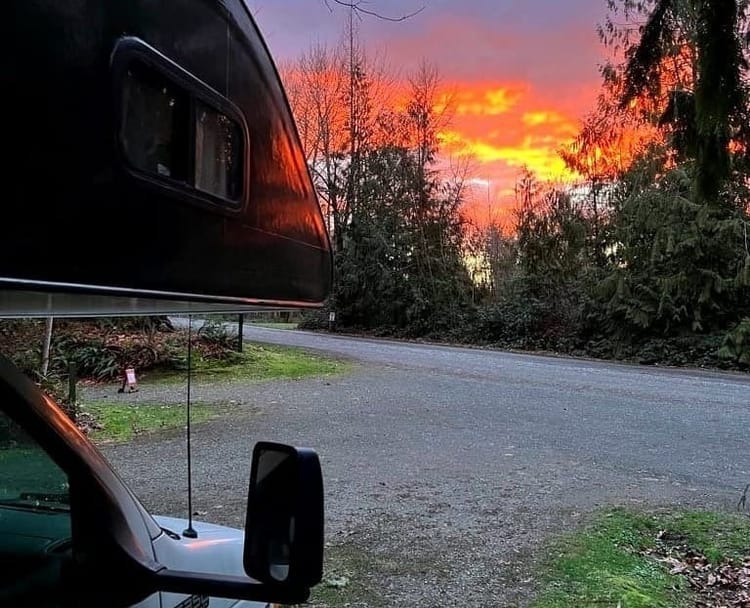
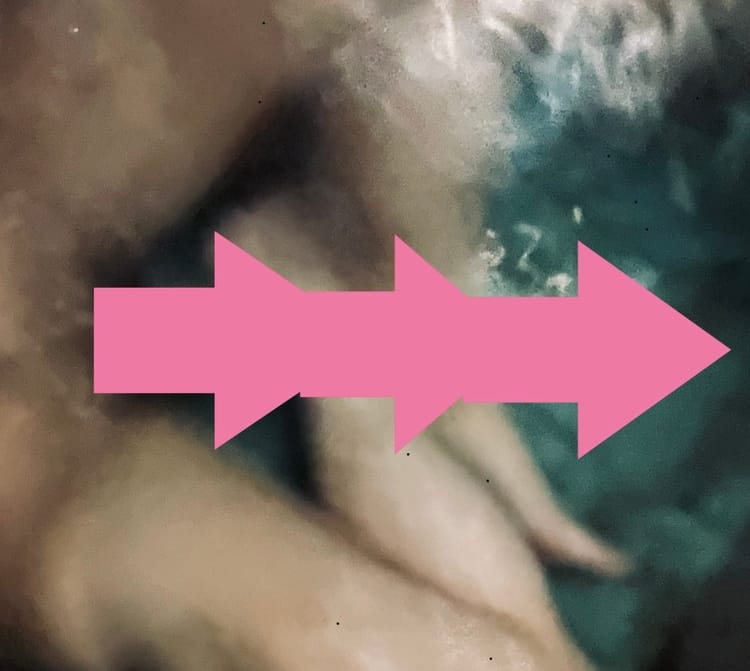
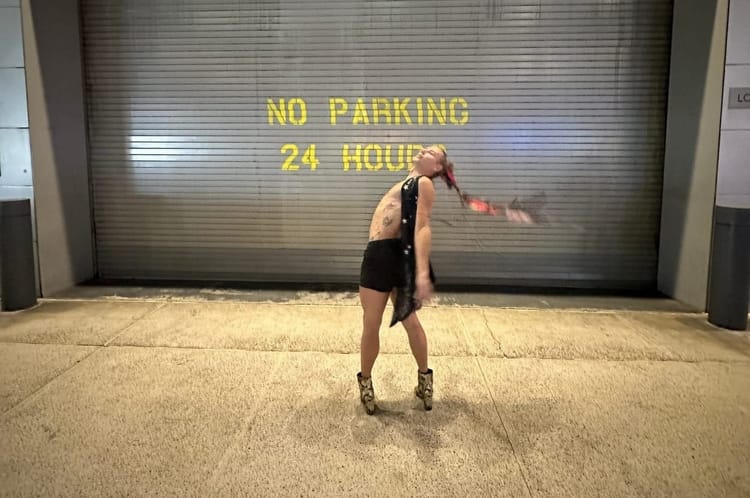
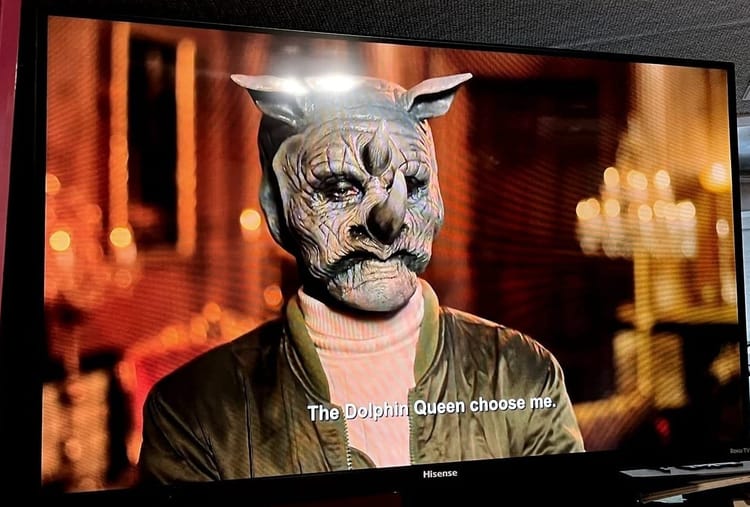
Member discussion